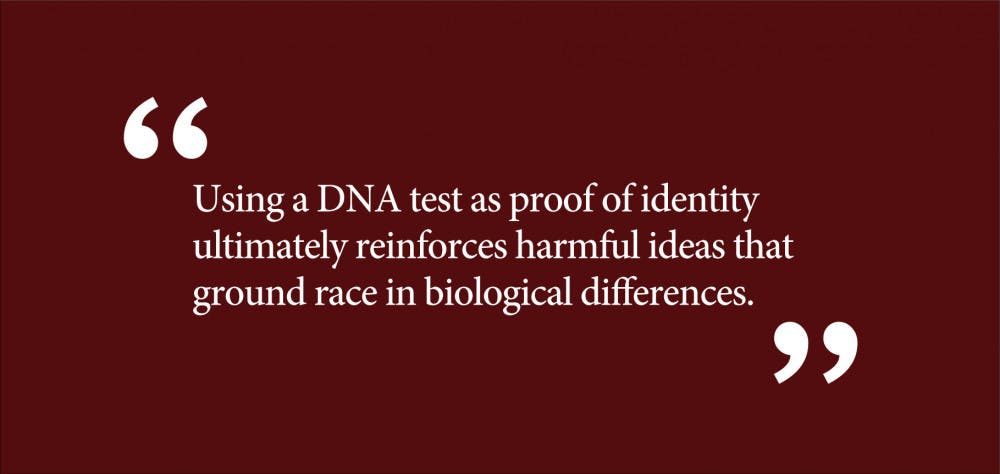Last week, Sen. Elizabeth Warren (D-MA) released a series of videos discussing her Native American heritage, as well a DNA test that concluded she had a Native American ancestor six to ten generations back. Though Warren took this DNA test in response to racist taunts from President Trump and others on the right, using a DNA test as proof of identity ultimately reinforces harmful ideas that ground race in biological differences.
The fraught relationship between genetics and race is not new: Genetics has been used to justify racist ideologies essentially since it has existed as a field. Though scientists and anthropologists now agree that race is a social, rather than biological, construct, the rising popularity of genetic testing services is bringing old ideas about race and biology back to the forefront. To be clear, genetic tests cannot tell anyone that their genome is a specific percent of any race or ethnicity, because there aren’t any genes that all black people share, for example. Rather, some genetic markers are significantly more common in some races and ethnicities than others, which genetic testing companies use to make estimates. Unfortunately, this nuance has been lost in translation. For instance, one man recently sued the federal government, claiming his small business should be classified as minority-owned because a DNA test estimated his ancestry was four percent sub-Saharan African and six percent indigenous American. More worryingly, white supremacists are using the language of genetics to further their cause. In 2017, for example, a group of white supremacists posted a video of members chugging milk, highlighting the gene that allows adults to digest lactose, which is more common in white people.
By submitting to a DNA test, Warren legitimized this discourse connecting race and genetics. Though she did not claim to have any particular percentage of Native American “blood,” and DNA isn’t passed down equally from all ancestors, that didn’t stop the Boston Globe and the Republican National Committee from attempting to calculate percentages. As Masha Gessen argued in an opinion for the New Yorker, by releasing a DNA test, Warren is “reinforcing one of the most insidious ways in which Americans talk about race: as though it were a measurable biological category, one that, in some cases, can be determined by a single drop of blood."
Many Native Americans are angry about Warren’s actions, and the Cherokee Nation publicly condemned her use of the DNA test, explaining that by emphasizing ancestry rather than tribal membership, DNA testing is “privileging nonindigenous definitions of being indigenous.”
Some might argue that Warren is not at fault, as she was simply responding to Trump, who called her racist names and promised to donate $1 million to charity if she got a DNA test (a promise he abandoned) . And to be clear, we should absolutely criticize Trump for this despicable, racist behavior. Yet Warren amplified the situation by releasing the genetic test; the fact that Trump “started it” doesn’t excuse her actions. Ultimately, taking a DNA test as “proof” of Native American heritage is bad for Americans’ understanding of both race and genetics. By giving racial discrimination a basis in “science,” this misunderstanding has tangible and sometimes tragic consequences.
Rebecca Aman ’20 can be reached at rebecca_aman@brown.edu. Please send responses to this opinion to letters@browndailyherald.com and op-eds to opinions@browndailyherald.com.





